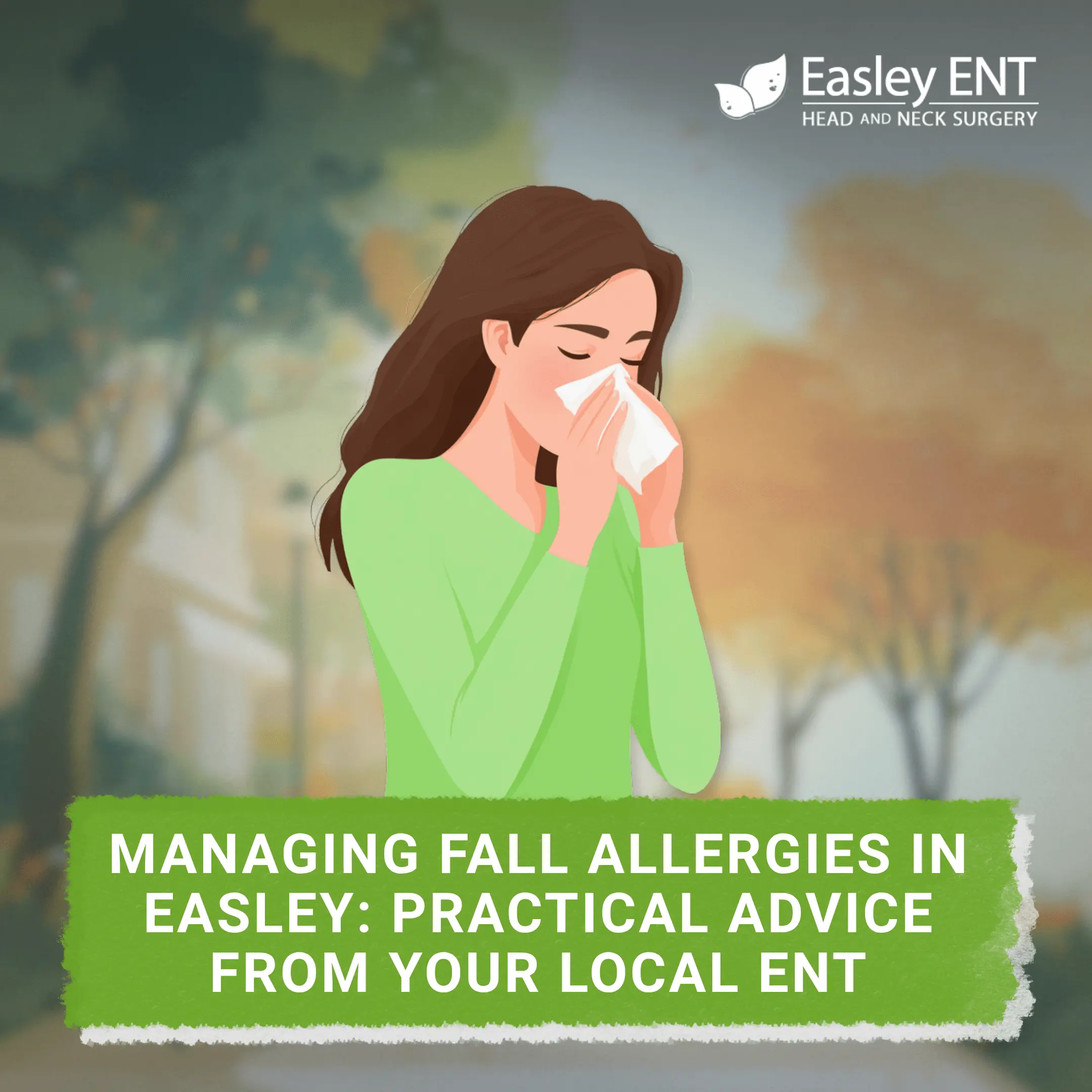Managing Fall Allergies in Easley: Practical Advice From Your Local ENT
Publised on
November 11, 2025

The fall season means cooler air and more layers to keep warm. More than the smell of pumpkin spice in the air, it also brings in a surge of irritants that can trigger an array of allergy symptoms for residents across Easley and nearby South Carolina communities.
As we transition from one season to the next, allergens become constants in the air, making it a challenging time for allergy sufferers.
🍂What Causes Fall Allergies: Easley, SC, Residents Must Know
Fall is often a high-allergy season in Upstate SC due to the increase of airborne allergens and irritants.
During this time, ragweed, sagebrush, marsh elder, and Russian thistle are the major culprits for triggering allergy symptoms. Pollen can travel long distances, causing widespread allergic reactions.
Mold spores can also increase during this time of the year, due to the presence of decomposing leaves.
🤧Common Fall Allergy Symptoms in Easley, SC
Allergy symptoms may vary, but common allergy symptoms during the fall season in Easley, Greenville, and other nearby SC communities may include:
- Frequent sneezing
- Runny nose with thin, watery, and clear mucus discharge
- Nasal congestion
- Scratchy throat and/or coughing
- Itchy and watery eyes
- Headaches
- Postnasal drip
- Fatigue
🗒️How to Manage Fall Allergies in Easley
With efficient strategies for ENT allergy care, Easley residents can better manage their symptoms despite the increase in allergens and irritants in the air.
✅Reduce your exposure to potential allergens
- Monitor daily pollen levels and forecasts in Easley, Greenville, and other upstate SC cities.
- When pollen levels are high, stay indoors if you can.
- Keep doors and windows closed during peak pollen hours.
- If you’re going out, use dust masks, hats, and sunglasses to minimize exposure.
- Once you get home, immediately shower and change clothes.
- Vacuum, dust, and clean your home regularly, especially high-traffic areas.
- Wash bedding with hot water frequently.
- Use HEPA filters in HVAC systems, vacuums, and air purifiers.
- If you have pets, keep them clean, bathe them frequently, and keep pet areas clean.
- Regularly trim trees, remove weeds, and mow grass.
✅Support and boost immunity
- Drink plenty of water to keep yourself hydrated.
- Maintain a healthy diet of nutrient-rich foods.
- Exercise regularly.
- Get adequate sleep and rest.
- Practice frequent handwashing.
✅Consider over-the-counter relief options
- Antihistamines
- Decongestants
- Nasal corticosteroid sprays
- Eye drops
- Pain relievers
⚠️Talk to a pharmacist or your doctor before starting any new medication.
✅Explore professional allergy and sinus care with your care provider
- Allergy testing can help identify your specific allergy triggers and allow your care provider to tailor treatment plans based on your results, medical history, and personal health goals.
- Start your allergy medications early, before peak allergy season starts. This may reduce the severity of your reaction.
- Explore sublingual immunotherapy (SLIT) or allergy drops, which may support your immune system to gradually build a tolerance to your allergens over time.
⚠️Note that SLIT is not FDA-approved for all allergens. A consultation with your care provider can determine if this is the appropriate direction for your condition.
Seasonal Allergy Relief With Easley ENT
Here at Easley ENT, we understand how frustrating allergies can be and how untreated conditions can impact your daily life–from the enjoyment of simple things to your productivity.
Our team offers in-office allergy testing and ENT evaluations to assess symptoms and recommend appropriate treatment plans for patients in Easley and across Upstate SC.
Are you ready to take control of your allergies? Our team at Easley ENT is here to help. Schedule a consultation and learn more about your options for managing allergy symptoms effectively.
The information provided in this article is for informational and educational purposes only and does not constitute medical advice. It is not intended to diagnose, treat, cure, or prevent any disease or medical condition. Always seek the guidance of your physician or other qualified healthcare provider with any questions you may have regarding a medical condition or treatment.
Results may vary: Treatment outcomes and health experiences may differ based on individual medical history, condition severity, and response to care.
Emergency Notice: If you are experiencing a medical emergency, call 911 or seek immediate medical attention.
%201.png)

